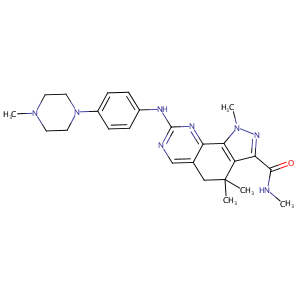| DOT Name |
DOT ID |
UniProt ID |
Mode of Action |
REF |
|
Cytochrome P450 1A1 (CYP1A1)
|
OTE4EFH8
|
CP1A1_HUMAN
|
Increases Expression
|
[8] |
|
Cytochrome P450 1A2 (CYP1A2)
|
OTLLBX48
|
CP1A2_HUMAN
|
Increases Expression
|
[9] |
|
Proepiregulin (EREG)
|
OTRM4NQY
|
EREG_HUMAN
|
Increases Expression
|
[10] |
|
L-lactate dehydrogenase A chain (LDHA)
|
OTN7K4XB
|
LDHA_HUMAN
|
Decreases Expression
|
[11] |
|
Protein c-Fos (FOS)
|
OTJBUVWS
|
FOS_HUMAN
|
Increases Expression
|
[12] |
|
Myc proto-oncogene protein (MYC)
|
OTPV5LUK
|
MYC_HUMAN
|
Decreases Expression
|
[13] |
|
Tumor necrosis factor (TNF)
|
OT4IE164
|
TNFA_HUMAN
|
Increases Expression
|
[14] |
|
Interleukin-1 alpha (IL1A)
|
OTPSGILV
|
IL1A_HUMAN
|
Increases Expression
|
[10] |
|
Interleukin-1 beta (IL1B)
|
OT0DWXXB
|
IL1B_HUMAN
|
Increases Expression
|
[10] |
|
Antileukoproteinase (SLPI)
|
OTUNFUU8
|
SLPI_HUMAN
|
Increases Expression
|
[10] |
|
Glyceraldehyde-3-phosphate dehydrogenase (GAPDH)
|
OTBPMIMW
|
G3P_HUMAN
|
Decreases Expression
|
[11] |
|
Protein S100-A8 (S100A8)
|
OTVMOB3F
|
S10A8_HUMAN
|
Increases Expression
|
[15] |
|
Protein S100-A9 (S100A9)
|
OTOARHCS
|
S10A9_HUMAN
|
Increases Expression
|
[15] |
|
ATP-dependent translocase ABCB1 (ABCB1)
|
OTEJROBO
|
MDR1_HUMAN
|
Decreases Expression
|
[16] |
|
Hepatocyte growth factor receptor (MET)
|
OT7K55MU
|
MET_HUMAN
|
Increases Expression
|
[10] |
|
Interleukin-6 receptor subunit alpha (IL6R)
|
OTCQL07Z
|
IL6RA_HUMAN
|
Increases Expression
|
[5] |
|
Interleukin-8 (CXCL8)
|
OTS7T5VH
|
IL8_HUMAN
|
Increases Expression
|
[14] |
|
Apoptosis regulator Bcl-2 (BCL2)
|
OT9DVHC0
|
BCL2_HUMAN
|
Increases Phosphorylation
|
[17] |
|
Microtubule-associated protein tau (MAPT)
|
OTMTP2Z7
|
TAU_HUMAN
|
Decreases Expression
|
[18] |
|
Solute carrier family 2, facilitated glucose transporter member 1 (SLC2A1)
|
OTA675TJ
|
GTR1_HUMAN
|
Decreases Expression
|
[11] |
|
C-C motif chemokine 2 (CCL2)
|
OTAD2HEL
|
CCL2_HUMAN
|
Increases Expression
|
[5] |
|
Hexokinase-1 (HK1)
|
OTMPHE8O
|
HXK1_HUMAN
|
Decreases Expression
|
[11] |
|
Bone morphogenetic protein 6 (BMP6)
|
OT9WN536
|
BMP6_HUMAN
|
Increases Expression
|
[10] |
|
Mitogen-activated protein kinase 3 (MAPK3)
|
OTCYKGKO
|
MK03_HUMAN
|
Increases Phosphorylation
|
[14] |
|
Mitogen-activated protein kinase 1 (MAPK1)
|
OTH85PI5
|
MK01_HUMAN
|
Increases Phosphorylation
|
[14] |
|
Multidrug resistance-associated protein 1 (ABCC1)
|
OTGUN89S
|
MRP1_HUMAN
|
Decreases Expression
|
[16] |
|
Prostaglandin G/H synthase 2 (PTGS2)
|
OT75U9M4
|
PGH2_HUMAN
|
Increases Expression
|
[10] |
|
Caspase-3 (CASP3)
|
OTIJRBE7
|
CASP3_HUMAN
|
Increases Activity
|
[11] |
|
Mitogen-activated protein kinase 8 (MAPK8)
|
OTEREYS5
|
MK08_HUMAN
|
Increases Phosphorylation
|
[14] |
|
Mitogen-activated protein kinase 9 (MAPK9)
|
OTCEVJ9E
|
MK09_HUMAN
|
Increases Phosphorylation
|
[14] |
|
Neurogenic locus notch homolog protein 1 (NOTCH1)
|
OTI1WADQ
|
NOTC1_HUMAN
|
Decreases Expression
|
[19] |
|
Caspase-7 (CASP7)
|
OTAPJ040
|
CASP7_HUMAN
|
Increases Activity
|
[11] |
|
Transforming protein RhoA (RHOA)
|
OT6YOJ9N
|
RHOA_HUMAN
|
Decreases Expression
|
[20] |
|
Ras-related C3 botulinum toxin substrate 1 (RAC1)
|
OTKRO61U
|
RAC1_HUMAN
|
Decreases Expression
|
[20] |
|
Focal adhesion kinase 1 (PTK2)
|
OT3Q1JDY
|
FAK1_HUMAN
|
Decreases Expression
|
[20] |
|
Interleukin-24 (IL24)
|
OT4VUWH1
|
IL24_HUMAN
|
Increases Expression
|
[10] |
|
Transcription factor HES-1 (HES1)
|
OT8P19W2
|
HES1_HUMAN
|
Decreases Expression
|
[19] |
|
Advanced glycosylation end product-specific receptor (AGER)
|
OTPY0IH7
|
RAGE_HUMAN
|
Increases Expression
|
[15] |
|
PTB-containing, cubilin and LRP1-interacting protein (PID1)
|
OT5YJ7FI
|
PCLI1_HUMAN
|
Increases Expression
|
[10] |
|
Rho guanine nucleotide exchange factor 2 (ARHGEF2)
|
OTBQTFRT
|
ARHG2_HUMAN
|
Decreases Expression
|
[20] |
|
Multidrug and toxin extrusion protein 1 (SLC47A1)
|
OTZX0U5Q
|
S47A1_HUMAN
|
Decreases Expression
|
[16] |
|
NACHT, LRR and PYD domains-containing protein 3 (NLRP3)
|
OTZM6MHU
|
NLRP3_HUMAN
|
Increases Expression
|
[15] |
|
Cystine/glutamate transporter (SLC7A11)
|
OTKJ6PXW
|
XCT_HUMAN
|
Increases Expression
|
[10] |
| ------------------------------------------------------------------------------------ |
|
|
|
|


